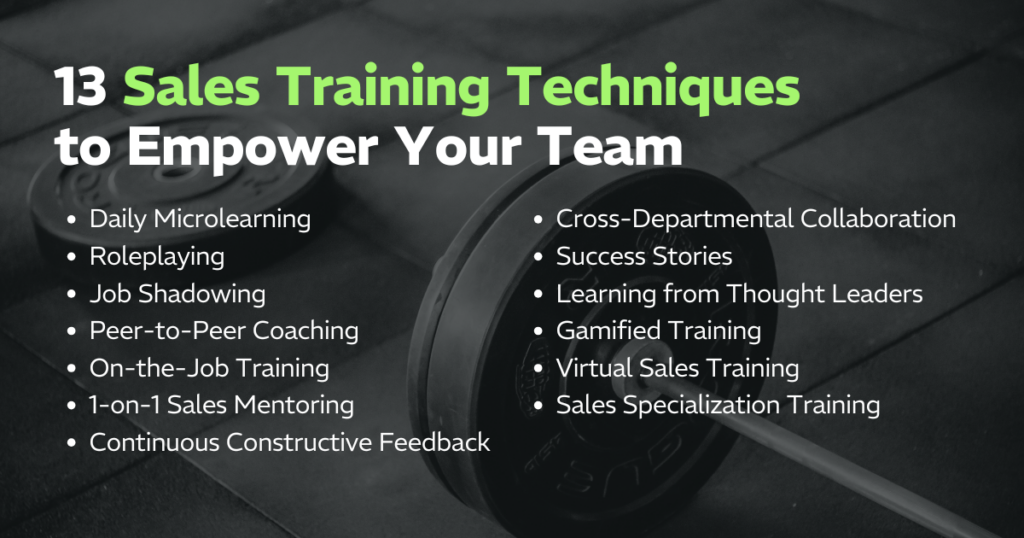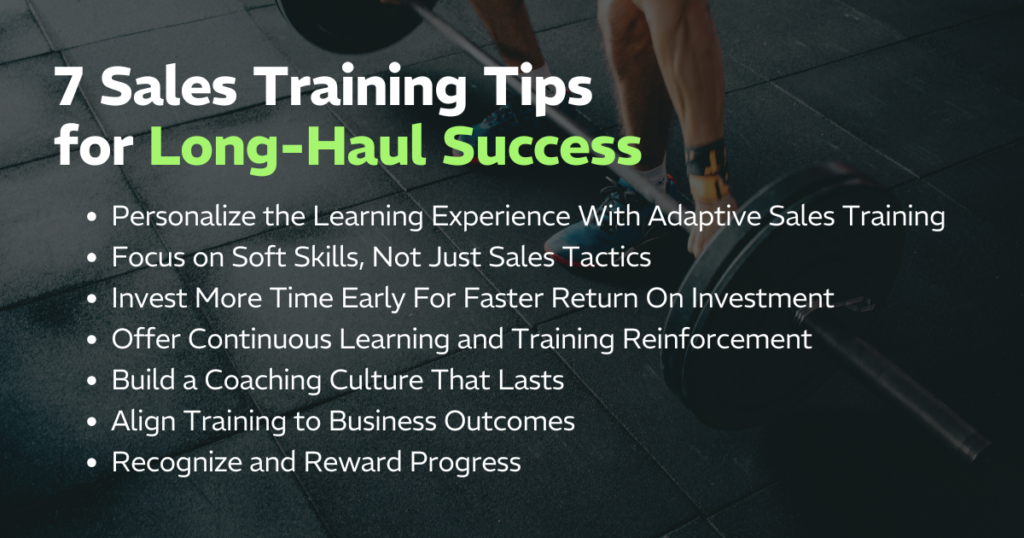Sales training techniques are the cornerstone of any high-performing sales organization—setting the foundation for sustained growth, confidence, and customer impact. Sales success doesn’t begin at the closing table—it starts much earlier, with how you train and empower your team from day one. Becoming a successful sales rep requires more than a script and a quota. It takes a modern, dynamic training approach that develops both skills and mindset over time.
The best sales training strategies today prioritize adaptability, customer-centric conversations, and real-world problem-solving. At the same time, they help reps build confidence, strong communication abilities, and a results-driven mentality. This is the essence of human-centered sales leadership: leading with empathy, intent, and impact.
13 Sales Training Techniques to Empower Your Team
Great sales teams aren’t built through lectures. They’re developed through engaging, hands-on training methods that create space for growth, collaboration, and continuous improvement. This is where structured sales training programs and practical training techniques make a difference.
One effective framework aligned with this approach is the 70-20-10 rule:
- 70% on-the-job learning
- 20% peer interaction
- 10% formal training
Why does it work? Because the majority of learning happens in real time, in the field, with real consequences and feedback. Let’s dive into the sales training techniques that can drive better outcomes. These sales training methods, when implemented consistently, create real transformation.
Daily Microlearning – Small Lessons, Big Impact
Short, focused training segments keep new information manageable and immediately applicable. Think video snippets, flash learning via Slack or email, interactive quizzes, or daily tips from sales leaders. Microlearning allows for consistent knowledge reinforcement without disrupting the workflow.
Roleplaying – Scenario-Based Training
Practice makes progress. Role-playing exercises simulate realistic sales interactions so reps can sharpen their objection handling, negotiation, and closing skills. It’s also a great confidence builder for new reps and an opportunity for managers to offer targeted feedback through personalized training sessions.
Job Shadowing – Learning by Watching the Best
There’s no substitute for watching a seasoned sales rep in action. Shadowing lets new hires experience live sales calls, presentations, and client meetings. This technique fast-tracks onboarding and gives junior team members a front-row seat to successful sales behaviors.
Peer-to-Peer Coaching – Learning from Top Performers
Your best teachers might be sitting on the sales floor. Pairing new hires with experienced reps encourages knowledge sharing and strengthens team culture. Peer coaching builds trust, accelerates learning, and keeps your A-players invested in team success.
On-the-Job Training – Learning While Selling
Real-time coaching during actual sales conversations helps reps apply what they’ve learned in real situations. It also allows managers to observe behavior and offer precise feedback that sticks. On-the-job learning is the most natural and effective method of skill development.
1-on-1 Sales Mentoring – Building Trust Through Individual Coaching
Sales managers must evolve from scorekeepers to mentors. Individualized sales coaching sessions create space for growth, not just accountability. These mentoring conversations offer targeted opportunities to build skills, reinforce training, and provide clarity. Done right, mentoring supports both immediate development and long-term career growth for every sales rep.
Continuous Constructive Feedback – Keeping Growth in Motion
Constructive feedback shouldn’t wait for performance reviews. It should be part of your regular rhythm—timely, actionable, and grounded in what’s working and where there’s room to improve. A culture of ongoing feedback and coaching sharpens performance, shortens sales cycles, and helps reps build confidence through repetition and support.
Cross-Departmental Collaboration – Learning Beyond Sales
The best salespeople understand more than sales. Encourage collaboration with marketing, product, and customer support teams to gain a 360-degree view of the customer experience. This strengthens messaging, helps address objections, and creates more alignment across the business. Knowing your product or service from all sides increases selling power.
Success Stories – Learning from Real Sales Wins
Nothing inspires like a real win. Create a library of internal case studies and success stories that spotlight what worked and why. Reviewing these stories in team meetings helps newer reps visualize success and gives everyone a blueprint for repeatable excellence. This not only boosts morale—it models the behaviors that lead to closing deals.
Learning from Thought Leaders and Industry Experts
Exposure to outside voices expands perspective. Sales conferences, workshops, and keynote presentations offer fresh insights and practical takeaways. Learning from industry experts helps teams stay ahead of trends, adopt new sales techniques, and see challenges through a broader lens.
Gamified Training – Using Incentives to Boost Engagement
Gamification turns training into a competitive, high-energy experience. Use leaderboards, badges, or team challenges to increase participation and knowledge retention. When learning is fun, people show up ready to grow. This approach can be especially effective when practicing cold call scenarios or sales pitch delivery.
Virtual Sales Training – Lessons From Anywhere
Remote or hybrid teams still need great training. Use a mix of live Zoom workshops, on-demand courses, and virtual coaching to stay connected. Virtual training increases access, but blending it with in-person sessions often yields the best results.
Sales Specialization Training – Becoming an Expert in Your Niche
Help your reps go deep, not just wide. Develop specialized training tracks based on role, industry, or product line. Subject matter expertise builds credibility with buyers and enables reps to solve more complex problems. Specialization sharpens sales skills and leads to more confident sales reps.

7 Sales Training Tips for Long-Haul Success
Success in sales training isn’t about one great session—it’s about sustained progress over time. Long-term training success relies on reinforcement, personalization, and a commitment to culture. These tips can help sales managers and leaders build the kind of environment where reps thrive consistently, not just occasionally.
Every great sales training strategy should evolve with the team. Here are a few essential sales training tips to maintain momentum and performance over time.
Personalize the Learning Experience With Adaptive Sales Training
Salespeople learn differently. Tailor training to individual strengths, experience levels, and learning styles. Personalized development plans show that you care—and they get better results.
Focus on Soft Skills, Not Just Sales Tactics
Soft skills like empathy, curiosity, and emotional intelligence make all the difference. Sales isn’t just about what you say—it’s about how you listen and connect. Build training modules around these core human abilities.
Invest More Time Early For Faster Return On Investment
High-quality onboarding is the greatest gift you can give a new sales hire. Front-loading training reduces ramp-up time, builds confidence, and increases early wins. Don’t rush it. Done right, your onboarding becomes a pipeline for future sales leaders.
This approach supports a faster return on investment—something we explore in depth in our guide to maximizing the ROI on sales training.
Offer Continuous Learning and Training Reinforcement
Great salespeople never stop learning. Reinforce skills over time with refreshers, follow-up coaching, and self-education resources. Build a culture of continuous improvement. For more ideas on how to motivate your sales team, explore proven engagement strategies.
Encourage your team to read, listen to podcasts, and engage in professional development consistently. Provide access, encouragement, and time. Ongoing training keeps everyone sharp, relevant, and ready to improve win rates across the board—especially when aligned with best practices on how to manage a sales team.
Build a Coaching Culture That Lasts
Sales teams thrive when coaching is embedded into the daily rhythm of work. Make development part of your one-on-ones, pipeline reviews, and even your team huddles. A consistent feedback loop drives accountability and growth—and helps reps evolve faster.
Align Training to Business Outcomes
Connect every training effort to real business goals. Are you trying to shorten the sales cycle? Improve close rates? Boost new product adoption? Reps are more engaged when they know the why behind the training and see how it directly impacts their success.
Recognize and Reward Progress
Salespeople are wired to win. When they hit milestones—whether it’s mastering a new sales pitch, improving on call reviews, or mentoring a new hire—recognize it. Celebrate growth. Training works best when people feel seen, supported, and celebrated for their development.

How to Choose the Right Sales Training Techniques for Your Team
Not every training strategy works the same for every team. The right approach depends on your sales model, team maturity, learning culture, and performance goals. Here are a few factors to consider when selecting the best sales training techniques:
Assess Your Sales Environment
Look at how your team sells—are you focused on inbound leads, outbound prospecting, or account-based selling? Do your reps spend more time in discovery calls, demos, or negotiating renewals? Tailor your training to the areas that impact revenue most directly.
Match Techniques to Team Experience
New reps may benefit most from roleplaying, onboarding-focused sessions, and shadowing top performers. Veteran salespeople may respond better to peer-led coaching, specialization training, and collaborative goal setting.
Align Training with Performance Gaps
Use data to drive your decisions. Are close rates low? Do cold calls fall flat? Are reps struggling to position a new product or service? Match your techniques to the specific skills or stages of the sales cycle that need attention.
Involve Your Sales Managers Early
Sales managers play a crucial role in training implementation and reinforcement. Involve them in the planning process so that coaching aligns with training, and you can create more consistent development across the team.
Once you’ve narrowed your focus, start small. Pilot 1–2 new training methods, gather feedback, and iterate. Over time, you’ll develop a system that fits your culture and delivers results.
Reevaluate Regularly and Stay Agile
What works for your team today might not work a year from now. Sales environments evolve—new technologies, market shifts, and customer expectations all demand continuous adaptation. Build regular review cycles into your training strategy. Ask what’s resonating, what’s outdated, and what needs adjusting. Agile teams that evolve their training stay competitive—and ahead of the curve.

Why Sales Training Is Your Competitive Edge
Companies that invest in strong sales training see higher win rates, retention, and revenue growth. From improving onboarding to building a resilient culture, the most effective programs are backed by strategy, supported by leadership, and delivered with intention.
If you want to take your team to the next level, now is the time to explore what a sales keynote by Ryan can do to activate new thinking, energize execution, and inspire results.











